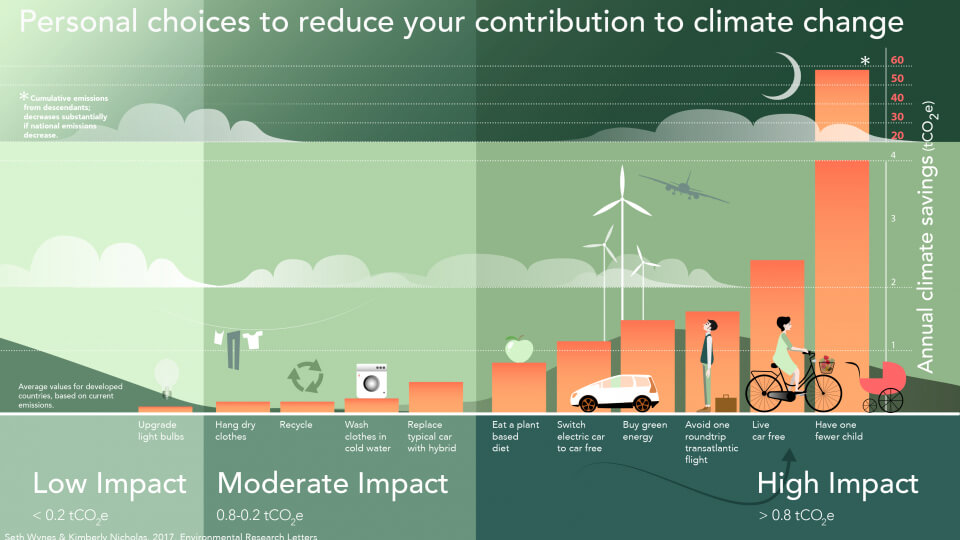The four lifestyle choices that reduce your ecological footprint the most
A new study has identified the four lifestyle choices that have the most significant impact on greenhouse gas emissions.
- Plant-based diet
- Avoiding air travel
- Car-free living
- Having fewer children.

Research outcome
The comprehensive study analyzed 39 scientific articles, carbon calculators, and government sources to quantify the most impactful personal lifestyle choices in developed countries.
“There are so many factors influencing the climate impact of personal choices, but by putting all these studies side by side, we are confident that we have identified actions that can make a significant difference. Those wanting to make strides in climate action need to know how our actions can have the greatest impact. This research is about helping people make informed choices,” says lead author Seth Wynes.
The study revealed that adopting a plant-based diet saves an average of about 0.8 tons of CO2-equivalents per year. Each avoided trans-Atlantic flight saves 1.6 tons, and a year of car-free living saves 2.4 tons.
To put this in context: by 2050, per capita CO2 emissions should not exceed 2.1 tons per year to achieve the goal of limiting global temperature rise to well below two degrees Celsius.
Family size also mattered: factoring in the impact of future offspring at current emission rates, having one less child would save 58.6 tons per year. However, reducing total national emissions could make the climate impact of an additional child up to 17 times smaller.
The study also showed that the four identified key actions are often overlooked in government recommendations and textbooks, which tend to advocate small, incremental changes like recycling or switching to reusable shopping bags.
However, according to the study, adopting a plant-based diet saves about 4 times more greenhouse gas emissions per year than recycling. Avoiding just one trans-Atlantic flight saves 8 times more, and living car-free saves 11 times more. Similarly, switching from plastic to canvas bags is less than 1% as effective for the climate as a year without meat consumption.
Kimberly Nicholas, associate professor at the Lund University Centre for Sustainability Studies and co-author of the study, says: ‘We acknowledge that these are very personal choices. But we cannot ignore the climate impact our lifestyle actually has. Personally, I found it very empowering to make many of these changes. It’s especially important for young people developing lifelong patterns to be aware of which choices have the most significant impact. We hope this information sparks discussion and empowers individuals,’ she concludes.
Dr. Jonathan Foley, director of the California Academy of Sciences, noted: ‘Institutions must also lead by example. We need to use our positions to demonstrate climate leadership and reinforce positive individual actions throughout society.’ The Academy announced on June 13 that it will achieve net-zero greenhouse gas emissions by 2025, becoming the first major science museum to do so.
Note:
All actions were compared on a life cycle basis for one person making the decision under current average conditions in developed countries. This means:
Plant-based diet:
Emissions saved by switching from omnivorous to a plant-based diet (e.g., the difference between emissions from food consumed by self-selected meat-eaters versus self-selected vegetarians). Includes emissions from fertilizers, methane production by livestock, and transportation of food to supermarkets.
One trans-Atlantic flight:
Emissions for one person flying a round trip (e.g., from New York to London) under average conditions. Note that long-haul flights are more (e.g., a round trip from London to Hong Kong is 2.97 tons).
Car-free living:
Emissions saved per person based on average vehicle kilometers traveled and vehicle occupancy. Includes emissions from car production and maintenance in addition to fuel combustion.
Having one less child:
Estimates the cumulative impact of current and future offspring based on the “percentage of blood” for the offspring and current emission levels for all emissions produced during the offspring’s lifetime, divided by the life expectancy of each parent.
Note: Buying green energy was sometimes, but not always, an action with significant impact.
Publication: The climate mitigation gap: education and government recommendations miss the most effective individual actions






















